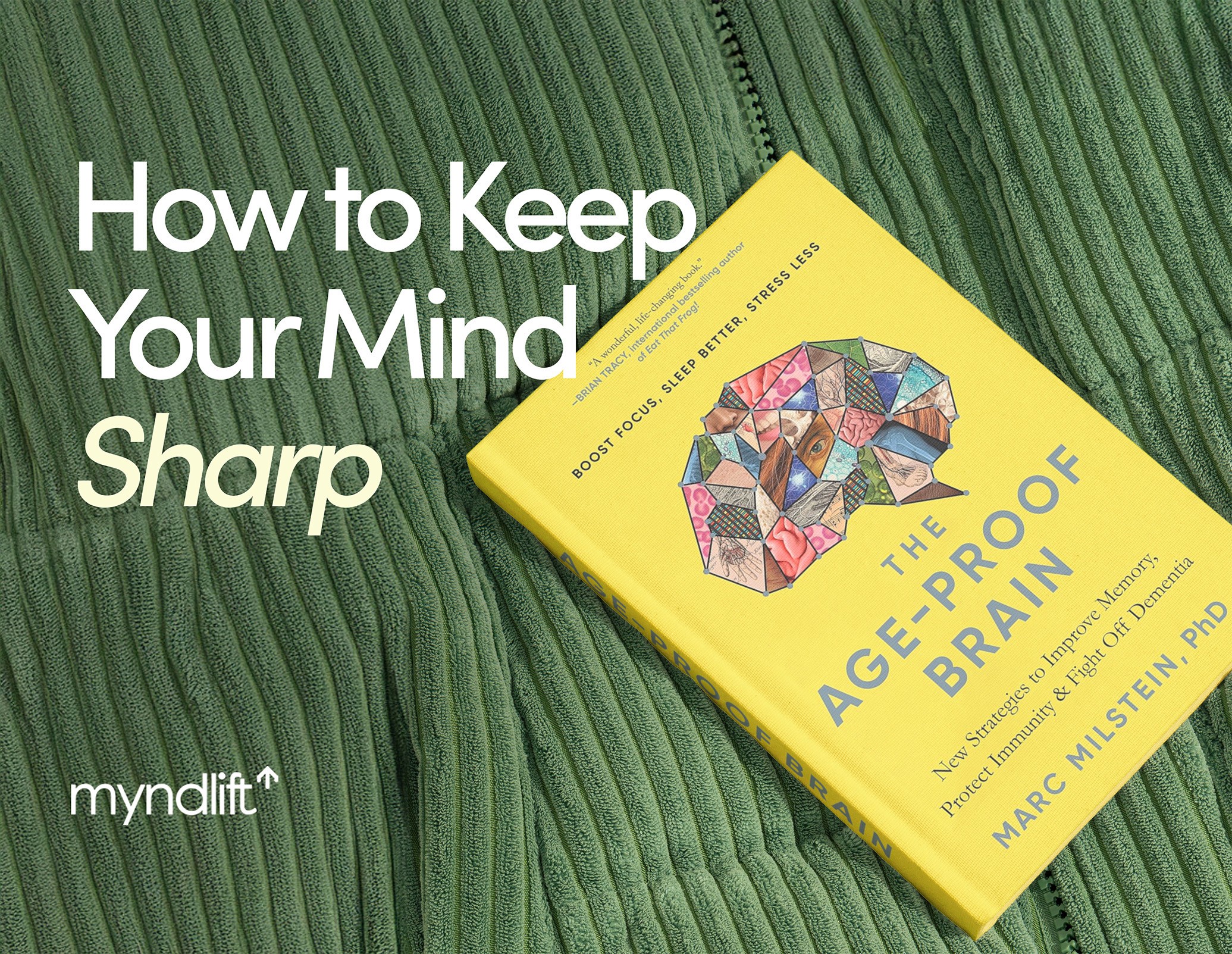Misplacing your keys or not remembering where you've parked your car are common memory lapses. Forgetting things occasionally is a part of life. In fact, these memory slips often become more commonplace as we age.
But if forgetfulness becomes progressive, it can stunt the ability to carry out daily activities. What is an example of a progressive memory slip? For instance, discovering that your misplaced keys weren’t still in the lock, but were actually in the refrigerator. Or, in very serious and extreme cases, not even realizing what the purpose of a key is.
These kinds of progressive memory lapses can signify cognitive decline and potentially even the onset of Alzheimer's. Alzheimer's disease is a neurological condition in which the progressive death of brain cells causes memory loss and cognitive decline. At present, physicians know no way of stopping or curing it. However, much can be done to reduce the risk of developing Alzheimer's in the first place.
What Happens to the Brain?
All sensations, movements, thoughts, memories, and feelings we experience stem from electrical signals that pass through billions of nerve cells, or neurons, in the brain.
Neurons constantly communicate with each other through these electrical charges. And because they consume high amounts of energy, they also release a lot of waste that consists mostly of leftover proteins.
Usually, other cells in the brain, such as astrocytes and microglia, are responsible for clearing away the waste and helping in keeping neurons healthy. However, when it comes to a brain with Alzheimer's, harmful changes in the brain destroy the ability of astrocytes and microglia to do their job and maintain a healthy environment for the neurons.
These harmful changes are triggered by two of the brain's proteins: beta-amyloid protein and tau protein. In people with Alzheimer's, abnormal tau accumulates and eventually forms tangles inside the neurons, referred to as neurofibrillary tangles. Additionally, the beta-amyloid clumps into plaque buildup between the neurons, which are commonly known as amyloid plaques. As the level of beta-amyloid increases, it causes a rapid spread of tau throughout the brain. This results in neurons gradually losing their ability to communicate.
As neurons begin to die, the brain begins to shrink, starting with the hippocampus, a vital part of the brain for learning and memory. That shrinkage causes memory loss, impaired decision-making, and language problems.
As more neurons die throughout the brain, a person with Alzheimer's gradually loses the ability to think critically, access memories, make decisions, and function independently.
Reducing the Risk Factors
Alzheimer's develops from multiple factors, and while some risk factors, including age, family history, and heredity can't be changed, there are other factors that can. These include:
Exercising the mind: People who regularly engage in mentally stimulating activities have a large number of backup neural connections. So even if some of their neurons lose the ability to communicate, backup neural connections can slow down the process of the disease or alleviate its symptoms.
Eating healthy: Specific types of food can affect the risk of Alzheimer's disease, particularly the Mediterranean diet. A Mediterranean diet emphasizes whole grains, fruits and vegetables, fish and shellfish, and healthy fats like nuts and olive oil.
Doing regular physical exercise: Several studies that have looked at middle-aged people and the effects that physical exercise has had on their thinking and memory later in life. These studies reported improvements in thinking and memory and reduced rates of Alzheimer's disease.
Improving sleep quality: Researchers found that individuals who slept fewer than five hours per night were twice as likely to develop dementia.
Detecting and treating depression: Many cognitive functions, such as attention, memory, and planning, can be affected by depression. Untreated depression can significantly increase the risk for Alzheimer's disease.
Exercising the Mind: The Nun Study
In this study, 678 nuns, all over the age of 75 when the study began, were followed for more than two decades. They were regularly given physical checkups and cognitive tests, and when they passed, their brains were donated for autopsy.
In some of the brains, scientists discovered that despite the presence of brain shrinkage (what appeared to be Alzheimer's), the nuns to whom those brains belonged showed no signs of having the disease while they were alive. The study showed that the reason for this was that these nuns had more functional synapses as a result of regularly engaging in mentally stimulating activities.
So even though Alzheimer’s was compromising some of their synapses, they had many extra backup connections that significantly stunted their symptoms.
Ways to Stay Sharp
Creating and strengthening new neural connections doesn't equate to doing the crossword puzzle in the newspaper as you drink your morning coffee. That’s because simply retrieving already learned information is similar to traveling down an old, familiar road. In order to pave new neural roads, you’d need to learn something new.
Some activities that may help strengthen yet-undamaged neural pathways are:
Learning to speak a foreign language: Researchers discovered that the symptoms of Alzheimer's disease are halted by up to five years, on average, in people who fluently speak more than one language.
Learning to play an instrument: Playing a musical instrument throughout life is associated with a lower risk of developing dementia.
Training your brain with neurofeedback: Neurofeedback can help improve symptoms, enhance cognitive performance, and delay disease progression if done consistently.
Reading: Reading reinforces skills in working memory, visual memory, spatial processing (the ability to tell where objects are in space), motor skills, and helps reduce the risk of dementia.
Following the road less traveled: Literally! Taking a new route during a daily walk or even eating with a non-dominant hand can disrupt your routine habits (in a good way) and create new neural pathways.
Read more about the impact of neurofeedback on cognitive decline here.
Conclusion
Even though there's no cure for Alzheimer's disease, working on lifestyle changes, constantly learning, and improving cognitive performance can reduce the risk and alleviate the symptoms.
But, As Lisa Genova states in her book Still Alice, even if you or a loved one are someday diagnosed with Alzheimer's, you won't lose your emotional memory, and you'll still be able to understand love and joy. You might not remember what you read five minutes ago, but you'll remember how that sentence made you feel. And, ultimately, always know that you are more than what you can remember.
Multiple Myndlift users report monthly about changes in their behavior and lifestyle. Get matched with a Myndlift Provider, either by finding one in your area or by enrolling in our Total Remote program.
About the author:
Dubravka Rebic
Dubravka Rebic puts a lot of time and energy into researching and writing in order to help create awareness and positive change in the mental health space. From poring over scientific studies to reading entire books in order to write a single content piece, she puts in the hard work to ensure her content is of the highest quality and provides maximum value.
References
Snowdon DA; Nun Study. Healthy aging and dementia: findings from the Nun Study. Ann Intern Med. 2003 Sep 2;139(5 Pt 2):450-4. doi: 10.7326/0003-4819-139-5_part_2-200309021-00014. PMID: 12965975.
Sofi, Francesco & Abbate, Rosanna & Gensini, Gianfranco & Casini, Alessandro. (2010). Accruing evidence on benefits of adherence to the Mediterranean diet on health: An updated systematic review and meta-analysis. The American journal of clinical nutrition. 92. 1189-96. 10.3945/ajcn.2010.29673.
Robbins R, Quan SF, Weaver MD, Bormes G, Barger LK, Czeisler CA. Examining sleep deficiency and disturbance and their risk for incident dementia and all-cause mortality in older adults across 5 years in the United States. Aging (Albany NY). 2021 Feb 11;13(3):3254-3268. doi: 10.18632/aging.202591. Epub 2021 Feb 11. PMID: 33570509; PMCID: PMC7906211.
Green RC, Cupples LA, Kurz A, Auerbach S, Go R, Sadovnick D, Duara R, Kukull WA, Chui H, Edeki T, Griffith PA, Friedland RP, Bachman D, Farrer L. Depression as a risk factor for Alzheimer disease: the MIRAGE Study. Arch Neurol. 2003 May;60(5):753-9. doi: 10.1001/archneur.60.5.753. PMID: 12756140.
Snowdon DA; Nun Study. Healthy aging and dementia: findings from the Nun Study. Ann Intern Med. 2003 Sep 2;139(5 Pt 2):450-4. doi: 10.7326/0003-4819-139-5_part_2-200309021-00014. PMID: 12965975.
Anderson JAE, Hawrylewicz K, Grundy JG. Does bilingualism protect against dementia? A meta-analysis. Psychon Bull Rev. 2020 Oct;27(5):952-965. doi: 10.3758/s13423-020-01736-5. PMID: 32462636.
Balbag MA, Pedersen NL, Gatz M. Playing a Musical Instrument as a Protective Factor against Dementia and Cognitive Impairment: A Population-Based Twin Study. Int J Alzheimers Dis. 2014;2014:836748. doi: 10.1155/2014/836748. Epub 2014 Dec 2. PMID: 25544932; PMCID: PMC4269311.
Luijmes RE, Pouwels S, Boonman J. The effectiveness of neurofeedback on cognitive functioning in patients with Alzheimer's disease: Preliminary results. Neurophysiol Clin. 2016 Jun;46(3):179-87. doi: 10.1016/j.neucli.2016.05.069. Epub 2016 Jun 30. PMID: 27374996.
Lee ATC, Richards M, Chan WC, Chiu HFK, Lee RSY, Lam LCW. Association of Daily Intellectual Activities With Lower Risk of Incident Dementia Among Older Chinese Adults. JAMA Psychiatry. 2018;75(7):697–703. doi:10.1001/jamapsychiatry.2018.0657
Lisa Genova. Still Alice, Pocket Things, 2014.




